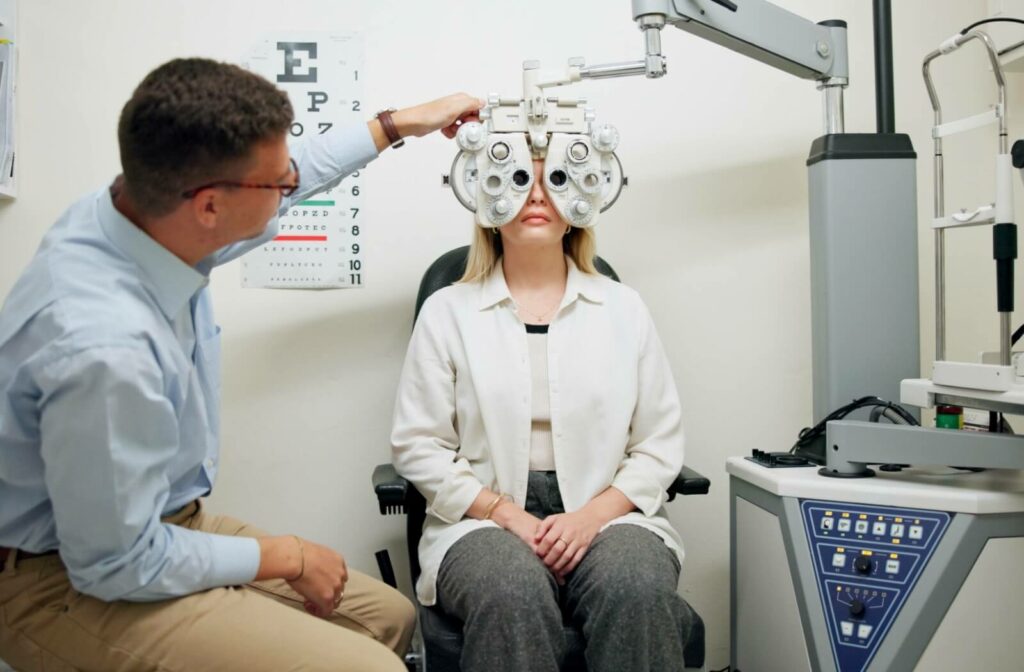If you notice your vision becoming blurrier or find yourself squinting to see more clearly, your glasses or contacts aren’t letting you down. More often than not, these are signs that your vision is changing.
No, it’s not your lenses making your vision worse. Contacts and glasses are tools that support your vision. If you have astigmatism, your vision might be worsening because of:
- Age-related eye changes
- Eye injuries or surgeries
- Kerataconos
- And other contributing factors
Astigmatism: A Closer Look
Many people need corrective lenses to help them see clearly. This is usually because the shape of their eye isn’t perfectly round.
In the case of astigmatism, this refractive error occurs when the cornea or lens has an irregular shape, causing the eye’s shape to take on more of a curve. This causes light rays to focus on multiple points in your eye rather than a single point on the retina, resulting in blurry or distorted vision at all distances.
Some people experience only mild blurriness, while others struggle with significant vision problems that take a toll on their daily lives. Common symptoms of astigmatism include:
- Difficulty seeing fine details
- Eye strain after long hours of focused work
- Headaches
- Trouble driving at night because of halos around lights
Most people are born with astigmatism. And while it tends to remain stable throughout most of adult life, that doesn’t mean your prescription will never change.
Why Is Your Astigmatism Getting Worse?
It’s natural to feel a little concerned if you’ve noticed changes in your vision, but slight fluctuations in vision are usually normal.
The key is understanding when changes warrant immediate attention versus when they’re simply part of your eye’s natural evolution. Gradual changes over several years are typically less concerning than sudden, dramatic shifts in your vision.
Aging & Its Effects on Your Eyes
There’s no denying it: with age comes change. Some, like fine lines or wrinkles, are more controllable than others.
Your cornea may gradually change its shape over time, while the lens of your eye will become less flexible—a condition called presbyopia. These age-related changes can cause existing astigmatism to worsen.
The tissues in your eye also lose some of their elasticity with age, which can contribute to changes in how light focuses on your retina. Additionally, conditions like cataracts become more common with age and can cause lenticular astigmatism as they develop.
Most age-related changes in astigmatism happen gradually over many years. However, if you notice sudden changes in your vision after age 40, it’s worth having an eye exam to rule out other conditions and update your prescription as needed.
Eye Injuries & Surgical Complications
Trauma to the eye can significantly affect the shape of the cornea, leading to worsening astigmatism.
Even seemingly minor injuries, such as getting hit in the eye with a ball or experiencing a scratch on the cornea, can cause lasting changes to your vision. Injuries that are more severe and damage the corneal structure can cause irregular astigmatism, which is challenging to correct with standard glasses or contact lenses.
Always visit your eye doctor immediately after an eye injury, no matter how minor it seems. A comprehensive screening can help identify any lasting effects on your vision clearly, often leading to better outcomes.
On top of that, always protect your eyes with safety glasses if you work in hazardous spaces (construction, trades, labs, etc.) and during sports to prevent injury.
Previous eye surgeries, while often beneficial, can sometimes lead to changes in astigmatism. Cataract surgery or corneal transplants can contribute to worsening astigmatism because they affect the cornea’s shape.
This doesn’t mean you should avoid necessary eye surgery, but it’s important to discuss potential vision changes with your surgeon beforehand.

Keratoconus: A Progressive Corneal Condition
Keratoconus is a condition where the cornea gradually thins and bulges outward into a cone-like shape, causing irregular astigmatism that progressively worsens over time. Keratoconus creates irregular distortions that are difficult to correct with standard glasses, which isn’t the case with its regular counterpart.
People with keratoconus often experience frequent prescription changes, increased sensitivity to light, and difficulty achieving clear vision even with corrective lenses. The condition can affect one or both eyes and may progress at different rates in each eye.
The sooner we detect keratoconus in its early stages, the better, as we can take measures to slow its progression.
Other Contributing Factors
Several other factors can influence astigmatism progression. Aggressively rubbing your eyes constantly, because of allergies or dryness, can gradually change the cornea’s shape over time.
Though research on this topic is still ongoing, it’s believed that spending long hours on digital screens can contribute to eye strain and change how your eyes focus, potentially leading to worsening astigmatism.
Can You Treat Astigmatism?
With modern tools, correcting astigmatism is very manageable, no matter the severity or underlying cause:
- Corrective Lenses: Glasses and toric contact lenses are the most common corrective options for astigmatism.
- Rigid Gas Permeable (RPG) Contact Lenses: For people with significant or irregular astigmatism, RPG contacts are the way to go. They create a smooth optical surface over your cornea.
- Scleral Contact Lenses: These specialty lenses are larger than your traditional contact lenses. They vault over the cornea, constantly hydrating the eye with saline solution.
- Refractive Surgery: LASIK and PRK surgeries can effectively improve astigmatism. These procedures reshape your cornea using precise laser technology.
Granted, some corrective measures will work better for you than others. Talk to your optometrist about which method is right for you.
Clearer Vision Awaits
While some factors like aging and genetics are beyond your control, regular eye care and prompt attention to vision changes can help preserve good vision and eye health.
If you’re experiencing changes in your vision or haven’t had an eye exam recently, don’t wait for serious problems to arise. Connect with our Total Focus Optometry team to book your routine eye exam. Clearer, comfortable vision is closer than you think.




